
15% Off – Code: SeasonEndSale – Exclusions Apply, Expires: 11/30/24

The answer, like most answers, depends on a number of things including the size of your cart, the driving range you need, and how often you want to replace your batteries. In this blog we’ll focus on some of the main issues with mobility scooter batteries and provide tips and guidance about how to maximize your scooter’s battery performance and lifespan.
The simple answer is a Dakota Lithium iron phosphate (LiFePO4) is the best battery for mobility scooters and wheel chairs: If price is of no consequence for mobility scooter batteries, Dakota lithium batteries are the way to go. They’re more expensive than SLA, AGM, and Gel batteries, but they can last up to 10 times as long making them lower cost in the long run. You also get 100% – 200% more driving range on a single charge with a Dakota lithium battery. That means if your cart could drive for 5 miles on a charge before it will go 10 – 15 miles on a charge by upgrading to Dakota Lithium.
Here’s 5 reasons why you should consider replacing your mobility scooter or electric wheel chair batteries with Dakota Lithium:
Dakota Lithium batteries are drop in replacements for sealed lead acid (SLA) batteries. That means if your scooter or chair uses a SLA or any 12V battery, you can replace it with a Dakota Lithium. You will get double the run time of lead acid by upgrading to Dakota Lithium. All of our batteries are universal 12V, meaning that you can replace your 12V SLA 1:1 with a Dakota Lithium battery. To determine what battery you need measure the length, width, and height of your battery, and/or or look for a DL battery with a similar or slightly higher Amp Hour (Ah) rating.
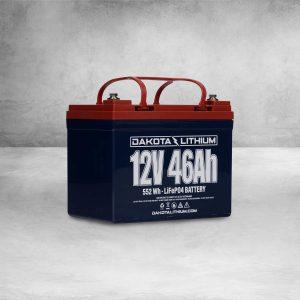
This shape of battery, called the U1 size, is the most common mobility scooter battery size.
The DL 46Ah battery is a drop in replacement for 30Ah and 35Ah SLA batteries but with 3X the battery range and runtime, making it the ultimate upgrade. Replaces U1 batteries and others. SIZE 9.5”L x 6.9” W x 7.44” H (242.5mm x 176mm x 189 mm). Often these batterie are in a pair, with two batteries linked together to make 24V. This is the most common mobility scooter battery.
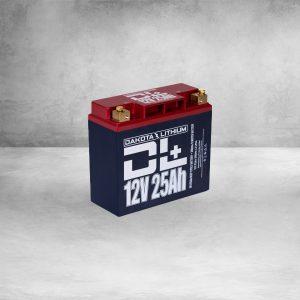
The DL 25Ah battery is a drop in replacement for 18Ah, 20Ah and 23Ah SLA batteries. It replaces UB12180, FM12180, 6fm18 and more. SIZE 7.125 in (181mm) L x 3.03 in (77mm) W x 6.69 in (170mm) H. This is a fairly common size in mobility scooters with smaller motors.
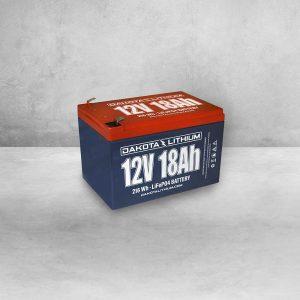
Replacement for 12Ah SLA mobility scooter batteries
The DL 18Ah battery is a drop in replacement for 12Ah batteries but with 3X the battery range & runtime, making it the ultimate scooter battery upgrade. This is the most common battery used by Pride Ultra Go-Go mobility scooters. SIZE 5.94″x 3.95″x 3.78″ (151x 99 x 96mm). Replaces 12Ah 12v SLA Batteries.
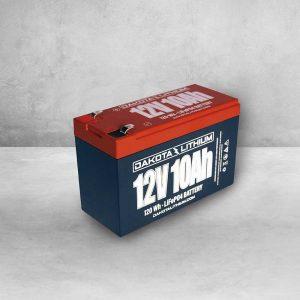 The DL 10Ah battery is a drop in replacement for 7Ah, 9Ah, and 10Ah SLA batteries but with 2-3X the battery range and runtime. Replaces UB1270 and UB1280 and others. SIZE 5.94″x 2.55″x 3.78″ (151 x 65 x 96mm).
The DL 10Ah battery is a drop in replacement for 7Ah, 9Ah, and 10Ah SLA batteries but with 2-3X the battery range and runtime. Replaces UB1270 and UB1280 and others. SIZE 5.94″x 2.55″x 3.78″ (151 x 65 x 96mm).
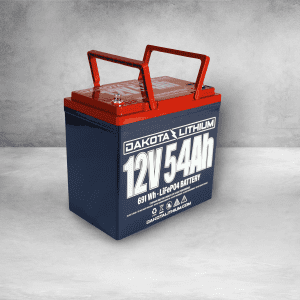 The DL 54Ah battery is a drop in replacement for 50Ah and 55Ah SLA batteries. Replaces UB12550 and any 12V battery with the same physical dimensions. Common size for wheel chairs. SIZE 9.01” x 5.43” x 8.38” (229 x 138 x 213 mm)
The DL 54Ah battery is a drop in replacement for 50Ah and 55Ah SLA batteries. Replaces UB12550 and any 12V battery with the same physical dimensions. Common size for wheel chairs. SIZE 9.01” x 5.43” x 8.38” (229 x 138 x 213 mm)
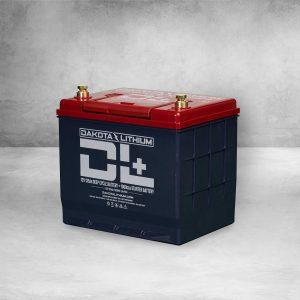 The DL+ 12V 135Ah battery is a drop in replacement for 12V 75Ah SLA batteries in pride mobility scooters and other brands. If your battery looks like a boxy car battery than this battery would be the ultimate upgrade. Our largest battery for mobility scooters, this battery provides 4X the usable power of a 75Ah SLA battery. That means if you had a 10 miles battery range before you will enjoy 40 miles of driving range after you upgrade.
The DL+ 12V 135Ah battery is a drop in replacement for 12V 75Ah SLA batteries in pride mobility scooters and other brands. If your battery looks like a boxy car battery than this battery would be the ultimate upgrade. Our largest battery for mobility scooters, this battery provides 4X the usable power of a 75Ah SLA battery. That means if you had a 10 miles battery range before you will enjoy 40 miles of driving range after you upgrade.
Many scooters and wheel chairs use two 12v batteries wired in series to make 24V. A bulk discount for ordering 2 batteries is applied at checkout. A LiFePO4 charger is recommended for optimal performance and a longer battery lifespan.
A Dakota Lithium mobility scooter battery will provide an average lifespan of 10 years.
Dakota lithium batteries last 5 – 10 times longer than the average lifespan of an AGM or lead acid mobility scooter batteries and are backed up by an 11 year warranty.
Most AGM and SLA battery manufacturers generally offer a 12-month warranty on traditional mobility scooter batteries. Most owners find mobility scooter batteries deliver an average lifespan of up to 18 months depending on usage. For mobility scooter owners who use their scooter infrequently (less than 1-2 times a week) a 2-3 year lifespan is common.
Good quality AGM or SLA mobility scooter batteries only last an average of 18 months. Most manufactures of old school mobility scooter batteries provide a 12 month warranty, indicating that the manufacturer expects the battery to only last 12 months. Eventually most batteries begin to lose their ability to charge fully or hold a charge and may need to be replaced. Here are some signs that you should replace your mobility scooter’s battery with a Dakota Lithium:
This can be a frustrating fault as your battery has malfunctioned all of a sudden and is unusable. This is common with AGM and SLA scooter batteries when they near their end of life. This indicates the battery needs to be replaced. Upgrading to Dakota Lithium batteries will eliminate this issue, since the batteries are designed to last 10 years.
If your scooter begins turning off unexpectedly this is likely because the batteries need to be replaced. As AGM and SLA batteries age the voltage drops more steeply each time you use them. This can be dangerous, especially if you use your scooter on roads. You should have someone check the batteries and replace them as soon as you notice the issue. Upgrading to Dakota lithium batteries will eliminate this problem, since Dakota lithium batteries have a flat voltage curve.
If you find that your driving range has decreased this is likely caused by the battery and indicates it needs to be replaced. AGM and SLA batteries will decline as they age, so after 12 – 18 months you may only get half of the driving range you used to. Upgrading the Dakota Lithium will fix this issue and allow you to drive farther with 2 – 3 times more driving range.
This is a common problem with AGM and SLA batteries. Lead acid batteries drop voltage quickly. As they age the voltage drops quicker and the indicator will show less capacity. This is a symptom that the batteries are near their end of life and need to be replaced.
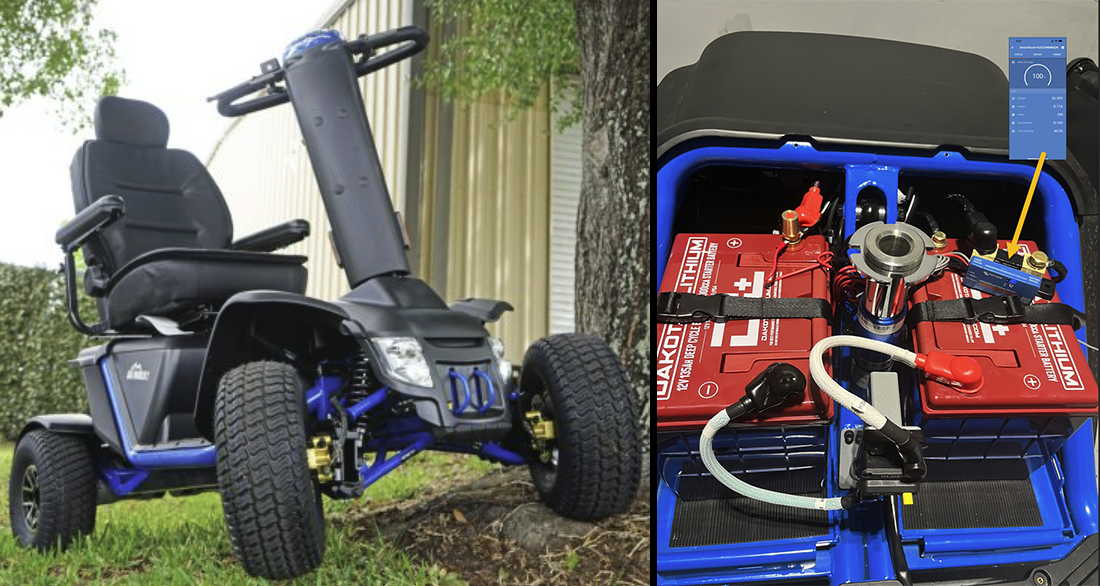
“These batteries are outstanding! I went from 2 75ah lead acid batteries in my mobility scooter…to 2 135ah lithium batteries. My scooter now runs at its max speed (11.4mph) for over 40 miles. No noticeable fade in power. Guaranteed for 11 years?? Excellent purchase!” – John Deegan
Most mobility scooters use 12V batteries wired in series to make a 24 volt battery system. The most common battery size is the U1 battery, also called a 12V 30Ah or 12V 35Ah battery. Any 12V battery can be used as long as it fits inside the mobility scooter compartment. Make sure the charger used to charge the battery is compatible (lithium batteries require lithium chargers and AGM batteries require AGM battery chargers since they charge at a lower voltage).
Dakota Lithium batteries are a lithium ion replacement for mobility scooter batteries. Find the a similar size battery as your old mobility scooter battery by measuring the length, width and height. A Dakota Lithium battery that is the same L x W x H or smaller will fit inside your scooter. By upgrading you will enjoy greater driving range, longer battery lifespan and reliability, and less weight.
Yes! The most powerful battery you can put in a mobility scooter is a Dakota Lithium battery. Made from lithium iron phosphate technology, a Dakota Lithium battery has 2 to 3 times the usable energy of the same sized mobility scooter battery. If you put a more powerful battery in your scooter you will have 2 to 3 times more battery and driving range. For example, if your scooter had a battery range of 5 miles before you will have 10 to 15 miles of battery range after upgrading to a more powerful Dakota Lithium battery. Lithium batteries are more expensive than traditional mobility scooter batteries initially, but over time they are less expensive. This is because Dakota Lithium batteries last up to 10 times longer and have an 11 year warranty.
Dakota Lithium batteries do not need to be on charge all the time. Dakota Lithium mobility scooter batteries have a low self discharge rate, that means you can charge the batteries and take it off the charger. Traditional batteries on the other hand do need to remain plugged in when not in use. This is because AGM and SLA batteries have a short lifespan and a high discharge rate, so they will lose energy quickly when unplugged.
Sealed lead acid (SLA) mobility scooter batteries are the least expensive battery. The problem is a SLA battery has a lifespan and warranty of 12 months. So you will need to replace the batteries more often. Gel mobility scooter batteries are usually more expensive because they can be recharged more times than sealed lead acid batteries, but they still have a lifespan of only 18 to 24 months. Lithium batteries are the most expensive initially, but the lowest cost over the lifetime of your scooter or wheel chair. This is because Dakota Lithium batteries last 10 times longer than SLA batteries, providing better value over time and increased performance with 2 to 3 times the battery range and half the weight of SLA or Gel batteries. Dakota Lithium provides an 11 year warranty.
Yes, you can use a lithium car battery on a mobility scooter. For example, a Dakota Lithium plus 12V 135Ah battery has the power to start cars and trucks plus deep cycle performance, making it interchangeable as a car battery or a mobility scooter battery. With 135 Amp Hours the DL+ battery would provide 40 to 50 miles of driving range. More than some electric cars. This type of battery is called a dual purpose battery.
If you find that your mobility scooter battery is draining fast this is likely indicates it needs to be replaced. AGM and SLA batteries will decline as they age, so after 12 – 18 months you may only get half of the driving range you used to and the battery will drain faster. Upgrading the Dakota Lithium will fix this issue and allow you to drive farther with 2 – 3 times more driving range.
If your mobility scooter battery won’t charge then it needs to be replaced or the charger needs to be replaced. Check the charger to make sure the charger is plugged in and the charger light turns on. If you are using a traditional mobility scooter battery most likely the battery needs to be replaced. If you are using a lithium battery most likely the charger needs to be replaced by a lithium compatible charger. AGM and SLA batteries will decline as they age, so after 12 – 18 months it is common that the batteries will stop accepting a charge. This will likely by preceded by a loss of driving range and a feeling that the battery is draining faster each time you use it. Upgrading the Dakota Lithium will fix this issue and allow you to drive farther with 2 – 3 times more driving range. Plus Dakota Lithium batteries last 10 times as long and are backed up by an 11 year warranty.
Gel and SLA mobility scooter batteries should be changed every two years. Dakota Lithium mobility scooter batteries should be changed every ten years.
Most AGM and SLA battery manufacturers generally offer a 12-month warranty on traditional mobility scooter batteries. Most owners find mobility scooter batteries deliver an average lifespan of up to 18 months depending on usage. For mobility scooter owners who use their scooter infrequently (less than 1-2 times a week) a 2-3 year lifespan is common.
A Dakota Lithium mobility scooter battery will provide an average lifespan of 10 years.
Dakota lithium batteries last 5 – 10 times longer than the average lifespan of an AGM or lead acid mobility scooter batteries and are backed up by an 11 year warranty.
Mobility scooters stop holding a charge when the have reached the end of their usable lifespan. If your mobility scooter battery is not holding a charge then it needs to be replaced or the charger needs to be replaced. Check the charger to make sure the charger is plugged in and the charger light turns on. If you are using a traditional mobility scooter battery most likely the battery needs to be replaced.
If you are using a lithium battery most likely the charger needs to be replaced by a lithium compatible charger. AGM and SLA batteries will decline as they age, so after 12 – 18 months it is common that the batteries will not hold a charge. This will likely by preceded by a loss of driving range and a feeling that the battery is draining faster each time you use it. Upgrading the Dakota Lithium will fix this issue and allow you to drive farther with 2 – 3 times more driving range. Plus Dakota Lithium batteries last 10 times as long and are backed up by an 11 year warranty.
Over charging the battery is caused by leaving the battery on the charger after a charge cycle is completed. For some batteries this will shorter the lifespan of the battery slightly but is otherwise not a significant problem.
Dakota Lithium batteries technically cannot be over charged. Each Dakota Lithium battery contains a battery management system that prevents the battery from being over charged.
Gel and SLA mobility scooter batteries cannot be over charged and are safe to leave on the charger. Since the capacity of gel batteries is smaller than lithium many owners leave their gel and SLA batteries on the charger whenever they are not using the scooter or wheelchair. If you have a Dakota Lithium battery this is unnecessary. You can charge the scooter and then safely remove it from the charger. This is because the self discharge rate of Dakota Lithium batteries is so low.
Avoid run your batteries completely empty and take care not to leave lights on after use.
When storing your scooter for more than 6 weeks, it is advisable to fully charge the batteries and disconnect them. Check and recharge the batteries monthly.
Avoid turning off the charger before the charge complete light turns red.
If you have lithium batteries use a lithium compatible battery charger.
Avoid leaving your battery attached to the charger after the charge cycle is complete. This is not critical, but there is data that taking a battery off the charger after the charge cycle is complete extends the battery life.
If you have gel or SLA batteries use the charger supplied with the scooter.
Always unplug the charger from the equipment, as well as the mains, after charging. (Some chargers can drain batteries if left plugged in while switched of or unplugged from the mains).
Gel and SLA mobility scooter batteries will last two to three years if not used. Dakota Lithium mobility scooter batteries will last up to ten years.
Most AGM and SLA battery manufacturers generally offer a 12-month warranty on traditional mobility scooter batteries. Most owners find mobility scooter batteries deliver an average lifespan of up to 18 months depending on usage. For mobility scooter owners who use their scooter infrequently (less than 1-2 times a week) a 2-3 year lifespan is common.
A Dakota Lithium mobility scooter battery will provide an average lifespan of 10 years.
Dakota lithium batteries last 5 – 10 times longer than an AGM or lead acid mobility scooter battery’s average lifespan and are backed up by an 11 year warranty.
Yes! You can put a 12V lithium battery in your mobility scooter to replace a 12V gel or SLA battery. By putting Dakota Lithium batteries in your scooter you will have 2 – 3 times more battery range and they will last 10 times longer than your old batteries. Lithium batteries are more expensive initially, but are less expensive over the lifetime of the product since you will not have to buy as many replacement batteries.
Not necessarily. A bigger lead acid battery would be heavier, so it may slow your scooter down. A lithium battery however is half the weight of a lead acid battery and has twice the usable power. If you upgraded to a lithium battery you scooter would likely go faster, maneuver better, and be able to drive further on a single battery charge. Dakota Lithium batteries also last longer, with up to 10 times longer lifespan and warranty.